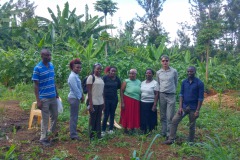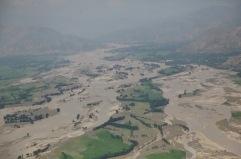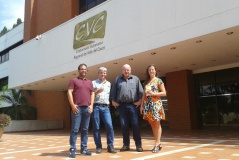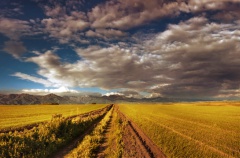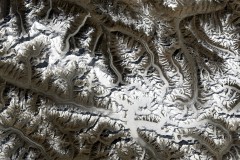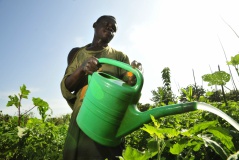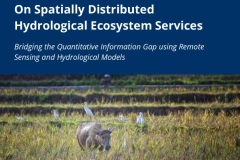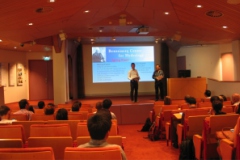Author: Martijn
19 January 2018
First ThirdEye flying sensor operators trained in Kenya
The ThirdEye project supports farmers in Kenya by setting up a network of flying sensors operators. These operators are equipped with flying sensors and tools to analyse the obtained imagery. In December ThirdEye staff conducted an intensive two weeks flying sensor training at Agricultural Training Centre (ATC) Kaguru, 15 km south of Meru, Kenya. The...
9 January 2018
Study conducted on water productivity mapping using flying sensors and crop modeling
Recently, FutureWater conducted a study for RVO to test the feasibility of mapping water productivity and yield gaps based on a combination of Flying Sensor imagery and crop water productivity modeling in order to provide plot-level recommendations to farmers. The objective of this pilot study was to achieve plot-level maps of water productivity and yield...
4 January 2018
Climate change will result in increased hydrological extremes in the upstream domains of the Indus, Ganges, and Brahmaputra
Hydrological extremes, such as the South Asian monsoon floods of last year, have a devastating impact on a society. Evidence suggests that hydrological extremes are increasing. To reduce the adverse impacts of hydrological extremes, adaptation strategies need to be developed, which requires knowledge on which drivers/processes are responsible for changes in hydrological extremes. For this...
2 January 2018
FutureWater started the HERMANA project with two missions to the Cauca Valley Corporation
Two missions in September and October 2017 were held in Calí, Colombia as the starting point of the HERMANA project. During these missions, the HERMANA team, composed by staff from Deltares, FutureWater, and the Dutch Water Authorities, shared Dutch and Colombian experiences in water monitoring, management and governance. Furthermore, they identified the main functional and...
28 December 2017
Higher crop water requirements due to climate change in Kazakhstan
The government of Kazakhstan with financial support of the Asian Development Bank (ADB) is planning to upgrade and rehabilitate its irrigation sector. A detailed Climate Risk and Vulnerability Assessment (CRVA) has been undertaken by a consortium led by FutureWater in 2017. The team collected all available data on the project and had undertaken a rigorous...
18 September 2017
Dutch climate experts join forces
Fourteen Dutch knowledge organisations have joined forces to provide government bodies and companies in the Netherlands and abroad with better policy advice on adapting to the enormous challenges posed by climate change. Today, they signed agreements to establish the Netherlands Consortium on Climate Change Adaptation (CCCA). The consortium will integrate knowledge and expertise from various...
14 September 2017
At least one-third of Asian glaciers will disappear
Even if the planet only warms up by 1.5 degrees Celsius – which is what the signatories to the Paris climate agreement are aiming for – one-third of all Asian glaciers will have melted by 2100, according to a study carried out by Utrecht University and FutureWater, which is published in Nature on 14 September....
1 September 2017
FutureWater releases new study on monitoring Water Productivity
Water Productivity, expressed as the amount of crop yield over the amount of water consumed (kg/m3), has been accepted as the standard to monitor sustainable water management. FutureWater has evaluated various methods, including satellites and Flying Sensors (drones) to monitor Water Productivity for a demonstration project ThirdEye in southern Mozambique. Monitoring Water Productivity is set...
7 July 2017
White paper published: On Spatially Distributed Hydrological Ecosystem Services
FutureWater published a white paper to demonstrate that, by leveraging technologies and remote sensing data, Hydrological EcoSystem Services (HESS) at the river basin scale can be effectively described, quantified and compared in space and time. This white paper demonstrates state-of-the-art methods for assessing different HESS and their tradeoffs under different development scenarios. It explores opportunities for...
4 July 2017
Boussinesq Prize 2017 awarded to Walter Immerzeel
Text adopted from: Boussinesqcenter.nl On Friday June 2nd Walter Immerzeel (Utrecht University) received the Boussinesq Prize 2017 awarded by prof. Bob Su. Walter Immerzeel has quickly become one of the most influential and highly cited young scientists in mountain hydrology, in particular on the effect of climate change on snow and glaciers in High Mountain Asia...
